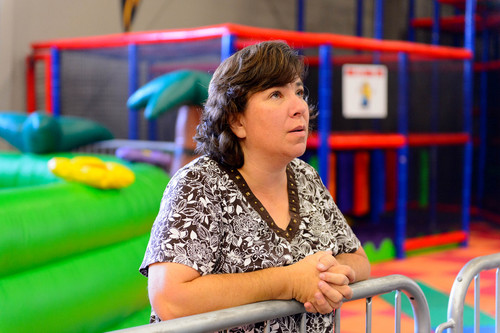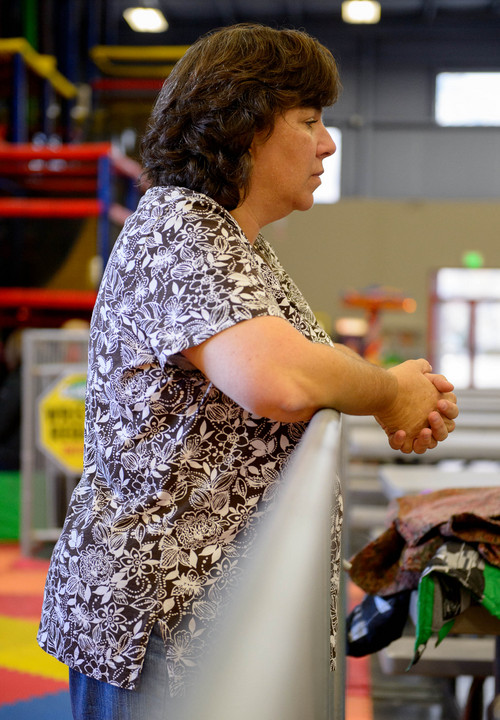This is an archived article that was published on sltrib.com in 2013, and information in the article may be outdated. It is provided only for personal research purposes and may not be reprinted.
Washington • The reason Brandon Beckham doesn't have health insurance is that he doesn't want health insurance — and he isn't going to let the Affordable Care Act force him to buy coverage.
Beckham, who owns a video-production business in Orem, will instead pay the tax penalty — $95 in 2014 — his way to protest a law he says violates his rights.
Tammi Velasquez, who lives in the same city, isn't a fan of the health reform law either, but she's enticed by the prospect of having stable insurance for the first time in a long time.
"I guess there is some conflict there, but if we don't get it, we are going to be fined," she said. "We better go on and see what we qualify for."
How skeptics of the law known as Obamacare respond to this open-enrollment period will go a long way toward determining if the reforms succeed or fail. The White House hopes there are far more Tammis than Brandons.
Early enrollment numbers were dismal in part because of the persistent technical problems plaguing healthcare.gov, the site where people from 36 states, including Utah, can shop for coverage if they are not insured through their job or a government program such as Medicaid or Medicare.
The administration is scrambling to improve the website, which can now accommodate about 25,000 people at a given time, but that's a meager amount when the goal is signing up some 40 million people by the end of March.
On top of the technical challenges, outside groups are spending big to discourage people, particularly the young and healthy, from signing up.
If they succeed and only older and sicker people buy coverage, it could lead to a spike in insurance prices, which would then scare away more people, which in turn would lead to another spike in prices. It's called a death spiral.
There are parts of the law that protect insurance companies from shortfalls in the next few years, guaranteeing an infusion of federal cash, but that is a stopgap measure. Obamacare's supporters and detractors agree that for the law to function, almost everyone has to buy in. Even those who think it is a lousy program.
—
A personal choice • The White House believes most people won't be swayed by political arguments.
"When you are talking about something as important as health care, the vast majority of Americans are going to put aside politics and make a decision that is in the best interest of their family," said White House spokesman Josh Earnest. "What we are trying to do is provide options to people who don't currently have health insurance and provide them high-quality health insurance in a way that they can actually afford for the first time."
Utah Gov. Gary Herbert, no fan of the health law, agrees with Earnest's premise, even if he is not so sure the coverage will be affordable.
"The consumer will make a decision on the set of facts they see at hand," he said. "Citizens will do what they think is in their own best interests."
Beckham, who is in his late 30s, says his political views match his best interests. He hasn't visited a doctor in a decade. Instead he eats right, exercises and takes natural remedies.
"I'm healthy. I handle my own health issues with my own method, through my own expense," he said, "For the government to basically insert itself between me and my right to handle my own health is a clear violation of the proper role of government."
Beckham, an active Republican, believes Obamacare won't survive another year in its current state. He predicts the disastrous rollout will lead to cascading problems that will make it politically untenable for Democrats to support the law as the key midterm elections approach next November.
Democrats in the White House and Congress promise that once people sign up, the political fervor against the law will subside, making it a political advantage rather than a liability. Right now, it is clearly a liability. A new poll by CBS News found a whopping 61 percent of respondents disapproving of the law.
—
Seeking details • Velasquez is among that 61 percent. She said the goal of expanding coverage is good, but she didn't like the way the law was passed with only Democrats supporting it. She also wishes states played a larger role.
"That's one of the things that bothers me, another big federal plan. I don't like that," she said. "I agree uninsured people need a place to get help but I'm not sure it is the government's place to give that to us."
Velasquez is rearing her four children and she tends a few others to make some money, while her husband, Serge, looks for work. He used to assemble computer chips and now he's training to be a bus driver in the Alpine School District. Even if he gets a route, it won't come with health insurance right away.
Their kids are covered through the Children's Health Insurance Program, but Tammi and Serge Velasquez have been uninsured since 2010. They have had health insurance for only one year out of the last 12.
When the Affordable Care Act's open-enrollment period began Oct. 1, Tammi Velasquez tried to see what she qualified for, thinking: "It would be nice to be able to say, 'Oh, this is going wrong, we can go to the doctor. We don't have to just live with it.' "
But the site didn't work.
She didn't look into it further until a woman in her Mormon congregation suggested inviting an expert to speak to the Relief Society. As president of the Relief Society in her ward, Velasquez thought it was a good idea. She did a little Internet searching and found Jason Stevenson with the Utah Health Policy Project.
The project is paid by the federal government to help people sign up for insurance through the new marketplaces, and Stevenson has given more than 80 presentations on the complicated program. He met about 30 women from her LDS ward at a church in Orem on Nov. 19 and spent an hour going through slides explaining what the law does and how it is intended to work.
Stevenson explained that only people who are uninsured or who buy their own plans on the individual market need to check out the online marketplace. Some will get federal subsidies to help pay for the insurance and those on the lower end of the income scale may eventually qualify for an expanded version of Medicaid. Herbert is still deciding whether to expand that program in Utah.
Velasquez may be among those eligible for expanded Medicaid, but at this stage her plan is to keep trying healthcare.gov until she can get through and see what she can apply for.
—
Filling the void • The federal government intended to spend heavily to promote healthcare.gov, but has had to sit on that money since it doesn't make much sense to encourage people to visit a glitchy website. That means there's been no federal effort to encourage Utahns to enroll.
"There is a hunger for real accurate information," Stevenson said. "The public relations or the education side of the Affordable Care Act has been a disaster."
In the absence of a major federal campaign, outside groups have tried innovative ways to encourage or dissuade people from signing up.
The Colorado Consumer Health Initiative has received national attention for provocative online ads featuring college men doing a keg stand, where two of them hold another man's legs in the air as he drinks beer directly from a keg. In another, a woman holds birth control in one hand and has her other arm wrapped around an attractive guy. Both ads include the catchphrase "Got insurance?"
"We were really looking at trying to fill a void in reaching young adults," said Adam Fox, who works for the Colorado group. "They are really important to the stabilization of health-insurance premiums and the marketplaces overall."
At the other end of the spectrum is FreedomWorks, a tea party group, which has urged young people to "burn your Obamacare card," a play on those who burned their Vietnam draft cards in the late 1960s.
"For a lot of young people, it's a really raw deal. You're going to overpay and essentially buy something that you don't need and can't afford," said Matt Kibbe, FreedomWorks president.
Will Jergins, 23, counts himself in that group, which is why he set up a display outside of the Electronic Learning Center in the heart of Southern Utah University on Halloween. For four hours he provided fake Obamacare cards for students to burn and he distributed "opt out" stickers and fliers, provided by Generation Opportunity, another conservative group trying to persuade young Americans to rebuff the health law.
Since he's under 26, Jergins could be covered through his parents' insurance but he refuses. And he won't buy a plan through Obamacare, a decision he says is part politics, part economics.
"I don't think people should have to buy health insurance if it is not right for them or if they can't afford it," said Jergins, the SUU chapter president of Young Americans for Liberty.
Jergins' mother wishes he would drop the protest and get covered.
"She is a little uncomfortable with it, but of course you would be worried about your kids if they didn't have insurance," he said. "But I'm young and healthy."
Stevenson said people like Jergins need to make this decision with "their eyes wide open."
Once the open-enrollment period ends in March, people won't be able to buy coverage unless they get a new job or have a change in their family status until next winter. And he says insurance isn't just about a person's health, but also about their finances, something he says many college-aged people don't think about.
"Your bones are going to heal a lot faster than your credit score," he said.







